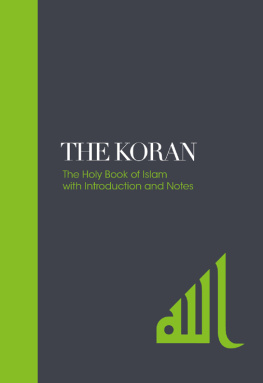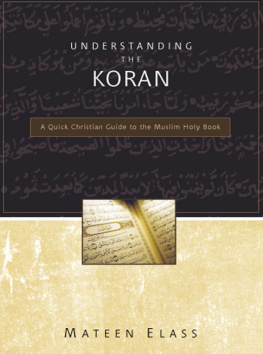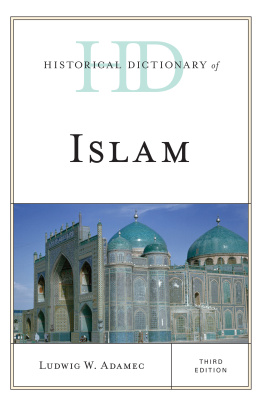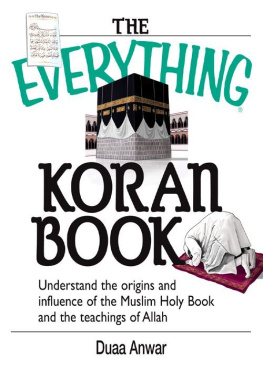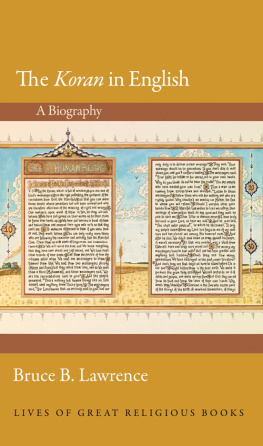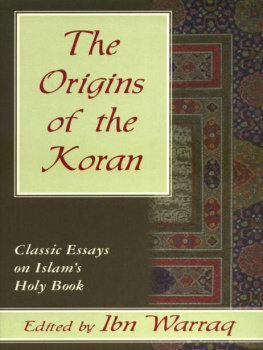SACRED TEXTS
THE
KORAN
The Holy Book of Islam with Introduction and Notes
Translated by E. H. Palmer
Introduction to this edition
by R. A. Nicholson

INTRODUCTION
A t the beginning of the seventh century of our era Arabian paganism was showing signs of decay. The influence of Judaism and Christianity, if seldom deep, was not confined to the numerous clans which had embraced one or other of these religions, but had made itself felt, as pre-Islamic poetry bears witness, amongst those who were still attached by custom and tradition to their tribals gods. We hear much of Christian hermits and also of a few persons known as hanfs, who had rejected idolatry for a religion of their own, ascetic and monotheistic; Mohammed appears to have been in touch with some of them before his call. In a word, acquaintance with higher and purer ideas had shaken faith in the old order of things, and shadows cast by the coming event were already visible.
For us, Mohammeds earlier life is almost a blank, since on this subject the Qurn gives little information, while the accounts of Muslim writers contain far more fable than fact. It may be taken as certain that he came of humble stock, passed his youth in poverty, and gained a respectable position through his marriage to Khadija. His journeys with the trading caravans of Mecca afforded opportunities for conversation with Jews and Christians, of which the Qurn preserves the result. If prophets are like poets, then what made Mohammed a prophet will never be known. Whether we regard it as a pathological case or a grand example of mystical ecstasy, the thing is essentially inexplicable, though at the outset of his mission a dominating motive can be discerned in his conviction that the Last Judgement was near and that he must at all costs warn his countrymen of the doom impending. That he believed himself to be the Messenger of Allah seems to me beyond doubt. Any other view involves the paradox that a world religion claiming at the present day over a hundred million adherents was founded by one who, not being peculiarly religious, was nevertheless capable of simulating religious enthusiasm so perfectly that his first essays in that style constitute for all Muslims and even for many who are not Muslims the clearest possible evidence of his prophetic genius. He was first and foremost a revealer, who uttered, by inspiration, truths which lay beyond the ken of his listeners, but which came with a conviction of reality when they were heard. The prophets chief qualification was vision rather than logical power or learning... His speaking was apparently unpremeditateda rapturous utterance, as though a power not himself were using him as a vehicle of communication. Those who read in Arabic the chapters of the Qurn revealed at Mecca and now placed at the end of the sacred volume will have no difficulty in applying the above description of the New Testament prophet to Mohammed. To say that the rest of the Qurn is, on the whole, uninspired does not mean that its author was conscious of fraud when he gave out all sorts of regulations and instructions in Allahs name. When, by force of circumstances, the prophet in him had grown into the ruler and legislator, it was a psychological necessity that he should still feel himself to be the chosen medium for the divine message: The Child is father of the Man.
He was addicted to the practice of solitary prayer, especially during the night, and may well have cultivated it for the purpose of inducing the abnormal states which caused his enemies to describe him as possessed by the jinn. It is important to observe that this practice was associated in his mind with the idea of Revelation. The opening verses of Surah LXXIIIO thou who art enwrapped! rise (stand up in prayer) by night except a littlethe half, or deduct therefrom a little, or add thereto, and chant the Qurn chanting. Verily we will cast on thee a heavy speech (a weighty word)surely depict the process by which many of the early revelations came. According to tradition, Mohammed was keeping vigil on a night of Ramadan, in or about the year 610, when he saw the vision of an Angel who seized him with a strong grasp, crying, Recite! (iqra), and after the Prophet had thrice refused to obey, himself recited the words that now stand at the beginning of Surah XCVI. This is said to have been the first recital (qurn), a term applicable to each of the succeeding revelations known collectively as the Recital (al-Qurn), Although Mohammed could not presume to think that what he heard was the voice of Allah, he never doubted its divine origin or believed that he himself had any part in shaping the form of the revelations as they were brought to him by the Spirit, whom he afterwards identified with Gabriel. On the contrary, he conceived them as excerpts, communicated in the Arabic tongue, from a Heavenly Book inscribed on a preserved tablet, whence are derived all prophetic revelations, including the Jewish, Christian, and Zoroastrian scriptures. Between these and the Qurn there is no essential difference. The Qurn is in the scriptures of yore and confirms their truth. As Allah is One, so his Revelation is One. This idea, momentous for the future of Islam, raised some awkward questions. Is the divine original fixed and unalterable? Obviously not; the Qurn often contradicts itself as well as other scriptures. Allah, then, changes his mind and alters the text of the Heavenly Book accordingly (Surah XIII, 39). Such is the famous doctrine of abrogation as stated in Surah II, 100: Whatever verse we may annul or cause thee to forget, we will bring a better one than it, or one like it; dost thou not know that Allah is mighty over all? To the Prophet, of course, this solution presented none of the difficulties which occur to ordinary men. His belief in a pre-established harmony of the Qurn with the ancient scriptures was maintained, with but slight reservations, even at Medina, where both Jews and Christians criticized his statements regarding books which he confessed himself unable to read; but as he was not in a position to fall back upon Dr. Johnsons plea of sheer ignorance, he countered their attack by alleging that they and their co-religionists had corrupted and falsified the Pentateuch, Psalms, and Gospels for their own ends.
One of the most disconcerting features of the Qurnits lack of connexion and continuityis partly due to the way in which the existing text was compiled. During the Prophets lifetime the revelations followed each other at brief intervals, and some of his hearers would learn them by heart or perhaps write them down on any material that came to hand, but neither he nor any one else seems to have thought of collecting them in a form that would secure their permanence. Only after his death, when disputes arose concerning the text, and when the number of those who carried it in their memories was rapidly decreasing, was the need for a complete and accurate recension of the Qurn felt to be urgent. The details are uncertain, but we know that in the Caliphate of Othmn an authorized edition was prepared by Zaid ibn Thbit, the Prophets amanuensis, with the assistance of three colleagues. This edition, which contains the Qurn in its present form, soon gained universal currency. While its value as a genuine record of the Prophets teaching and preaching cannot be impugned, the contents are in such a state of confusion that to read the book through from beginning to end is to miss all its significance as an historical document. Granting that the editors could not possibly have arranged the whole series of revelations in the exact order in which they were delivered, we must accuse them of ignoring chronology entirely. The plan they adopted was very simple, the place of each surah being determined by its length, and the longer ones preceding the shorter. Had this principle been reversed, readers would have less cause to complain, for in the earliest surahs the words are few and strong, contrasting strangely with the copious but somewhat pedestrian eloquence of those revealed at Medina, four of which come immediately after the opening prayer and occupy more than a hundred pages in the present translation. In attempting to restore the original order, European critics have divided the surahs into groups. The following table may be found useful, though the reader should bear in mind that many passages of diverse date and provenance remain embedded in surahs which have been assigned to a particular period:
Next page
